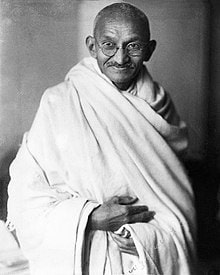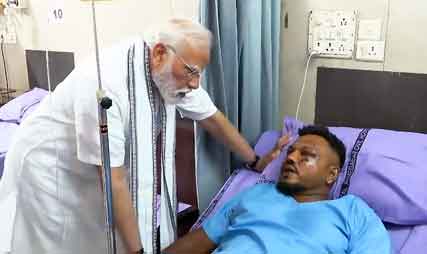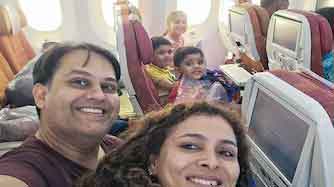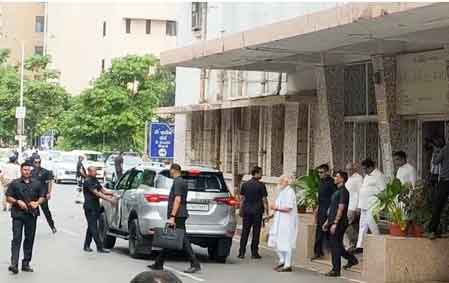As the nation celebrates the birth anniversary of Mahatma Gandhi, his legacy in Ahmedabad is far more than a historical memory -- it is a living, breathing force that continues to shape the city's ethos even today. Among the most potent symbols of this legacy is Navjivan Press, an institution representing Mahatma Gandhi's deep belief in the transformative power of words and the ethical responsibilities of journalism.
Located in the heart of Ahmedabad, this press served as a printing house and a vital organ of India's independence movement, where Mahatma Gandhi's ideas of non-violence, self-reliance, and moral integrity were translated into the printed word.
Navjivan Press, founded in 1919, played a crucial role during India's independence movement, not only as a printing house but as a centre for Gandhian thought.
Mahatma Gandhi, an astute printer and publisher, understood the significance of the press as a medium to spread his ideas of self-reliance, truth (Satyagraha), and non-violence (Ahimsa). It was through publications like Navjivan, Young India, and Harijan that Gandhi reached the masses, offering them not just news but a moral compass for navigating the colonial rule.
In a time when the British-controlled press often censored or disallowed critical content, Navjivan became a beacon of free speech and integrity. On September 7, 1919, Mahatma Gandhi purchased the Navjivan weekly from the Natwar Printing Press located near Khamasa Gate, Ahmedabad, after it became clear that no other press owner was willing to risk publishing his "radical anti-government ideas".
With 2,500 initial subscriptions, the Navjivan Weekly quickly became one of the most popular publications in Gujarat, amassing a readership of over 15,000, a record for any Gujarati weekly of that era. One of Navjivan Press' most significant publications is Hind Swaraj, a manifesto that laid out Mahatma Gandhi's vision for India's future.
In 1909, Mahatma Gandhi wrote Hind Swaraj in 10 days on board the SS Kildonan Castle during his voyage from London to Durban. The urgency with which he wrote the text is reflected in the fact that when his right hand grew tired, he switched to writing with his left hand. Initially written in Gujarati, Hind Swaraj critiqued modern civilisation and industrialisation, advocating for self-rule through non-violence.
For Mahatma Gandhi, publishing wasn't merely a business or a tool for propaganda -- it was an ethical responsibility. He famously said poor-quality printing was akin to violence because it deceived the reader. He insisted on high standards for typography, durable paper, and simple, functional book covers that would not add unnecessary costs.
Mahatma Gandhi wanted his books to be affordable to the common man. His autobiography, 'My Experiments with Truth', was initially priced at 12 annas, reflecting his desire to make important works accessible to all.
A Gujarat researcher recalls an anecdote encapsulating Mahatma Gandhi's uncompromising ethical stance. When the Navjivan Press once published a poor Gujarati translation of Gokhale's speeches, Mahatma Gandhi was asked to write the foreword. However, upon reviewing the translation, he declared it unworthy and demanded that the entire batch be destroyed. Even when told that the translation had cost Rs 700 -- a considerable sum at the time -- Mahatma Gandhi refused to back down, asking, "Do you think it desirable to place this rubbish before the public?"
Navjivan Press, like Mahatma Gandhi's entire philosophy, was not just about the immediate impact but about creating long-lasting, ethical systems. He used the press to propagate his ideas of self-reliance and truth, but it wasn't without challenges. The British authorities quickly noticed the influence of Mahatma Gandhi's writings on the Indian public. After he published a series of critical articles in Young India in 1922, the government retaliated by charging him with sedition.
On March 18, 1922, the streets of Ahmedabad buzzed as Mahatma Gandhi, accompanied by his confidants, walked to the courtroom. Despite the charges, the public respect for him was palpable -- everyone in the courtroom, including the judge, stood to greet him.
This trial did not stop Mahatma Gandhi from pursuing his mission. Although his press was confiscated and his files destroyed, he never wavered in his belief that the media should serve the public good. He famously remarked, "The press has a role to play. It has to become the people's Bible, Quran, and Gita rolled in one." He believed journalism should inspire courage, not fear, and that the truth could only be spoken when the press was free.
Today, Navjivan Press is more than just a printing house. It stands as a living monument to the values that Mahatma Gandhi cherished—truth, self-reliance, and non-violence.
With an annual turnover of Rs 1 crore, the press produces subsidised in-house publications, and its workforce of 135 people prints 20,000 copies daily. The press also generates revenue by copyrighting Mahatma Gandhi's collected works, including 'My Experiments with Truth', which has been translated into 24 foreign languages as well as Braille.






Tripura has begun experimental soilless hydroponic farming: Minister
The Tripura government has experimentally started the hydroponics method of cultivation without any soil, the state’s agriculture minister Ratan Lal Nath said here on Friday.
Assam Rifles seized cannabis worth Rs 30 lakh from Tripura
In a swift and decisive operation against narcotics smuggling, Assam Rifles, in close coordination with representatives of the Directorate of Revenue Intelligence (DRI), successfully seized approximately 195 kg of marijuana from the general area of Taranagar, Agartala during the early hours of 12 June.
High-Level Meeting Held to Curb Illegal Infiltration in Tripura
A high-level administrative meeting was held today at the state secretariat under the chairmanship of Chief Secretary J. K. Sinha, following the directives of Tripura Chief Minister Prof. (Dr.) Manik Saha, to review and strengthen measures against illegal infiltration in the state.
Agriculture minister announces development of 3 new paddy varieties in Tripura
The state agriculture and farmers welfare department minister Ratan Lal Nath on Friday announced development of three new paddy varieties in Tripura, which can address the recurring flood-related challenges faced by farmers in the state.
CM Dr Manik Saha inaugurates state-of-the-art Cancer Care Unit in Agartala Private Run Hospital
Chief Minister Prof. (Dr.) Manik Saha on Friday inaugurated a state-of-the-art Cancer Care Center at a private run hospital in Agartala. The new center has been established in collaboration with the International Oncology Cancer Institute, aiming to make quality cancer treatment more accessible within the state.
‘I can’t believe I survived’, says lone survivor of Air India crash in emotional meeting with PM Modi
Prime Minister Narendra Modi on Friday met Vishwash Kumar Ramesh, the sole survivor of the devastating Air India plane crash. Ramesh, a British national of Indian origin, is recovering from injuries sustained in the crash and is being treated at a hospital in Ahmedabad.
Ahmedabad crash: Two Manipuri crew members of London-bound Air India flight killed
Two cabin crew members from Manipur - Kongbrailatpam Nganthoi Sharma (20) and Lamnunthem Singson (26) – were killed when the London-bound Air India flight, carrying over 240 passengers, crashed shortly after taking off from the Ahmedabad airport.
Doctor couple’s dreams of new beginning in UK turned to ashes
A doctor couple’s dreams of a new beginning together as a family in UK turned into a nightmare and their last trip together as the ill-fated flight that was to take them to London crashed seconds after take-off on Thursday.